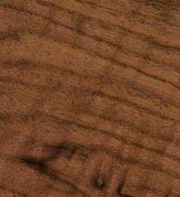Difference between revisions of "African walnut"
| Line 3: | Line 3: | ||
1) Golden yellow to reddish brown heartwood with darker streaks and veins from the ''Lovoa Trichilioides'' tree — a monoecious, evergreen indigenous to Central and Southern Africa’s tropical regions. The color of the African walnut darkens with age and exposure. The sapwood is generally narrow but can be up tp 3 inches (7.5 cm) and is clearly demarcated from the heartwood. African Walnut’s grains are typically straight or slightly interlocked — yielding good working properties — with a fine to medium, consistent texture and a fine natural luster. It often displays a ribbon-stripe figuring on quartersawn surfaces, similar to [[Sapele]]. It turns, glues and finishes well. The wood is considered moderately durable. | 1) Golden yellow to reddish brown heartwood with darker streaks and veins from the ''Lovoa Trichilioides'' tree — a monoecious, evergreen indigenous to Central and Southern Africa’s tropical regions. The color of the African walnut darkens with age and exposure. The sapwood is generally narrow but can be up tp 3 inches (7.5 cm) and is clearly demarcated from the heartwood. African Walnut’s grains are typically straight or slightly interlocked — yielding good working properties — with a fine to medium, consistent texture and a fine natural luster. It often displays a ribbon-stripe figuring on quartersawn surfaces, similar to [[Sapele]]. It turns, glues and finishes well. The wood is considered moderately durable. | ||
| + | |||
2) Another name for [[tigerwood]]. | 2) Another name for [[tigerwood]]. | ||
| − | + | ||
== Synonyms and Related Terms == | == Synonyms and Related Terms == | ||
Latest revision as of 14:16, 24 April 2022
Description
1) Golden yellow to reddish brown heartwood with darker streaks and veins from the Lovoa Trichilioides tree — a monoecious, evergreen indigenous to Central and Southern Africa’s tropical regions. The color of the African walnut darkens with age and exposure. The sapwood is generally narrow but can be up tp 3 inches (7.5 cm) and is clearly demarcated from the heartwood. African Walnut’s grains are typically straight or slightly interlocked — yielding good working properties — with a fine to medium, consistent texture and a fine natural luster. It often displays a ribbon-stripe figuring on quartersawn surfaces, similar to Sapele. It turns, glues and finishes well. The wood is considered moderately durable.
2) Another name for Tigerwood.
Synonyms and Related Terms
Lovia trichilioiides; undianuno preto (Port.); tigerwood
Physical and Chemical properties
- 1) Average Dried Weight: 34 lbs/ft3 (540 kg/m3)
- 1) Specific Gravity (Basic, 12% MC): .45, .54
- 1) Janka Hardness: 940 lbf (4,180 N)
- 1) Modulus of Rupture: 12,250 lbf/in2 (84.5 MPa)
- 1) Elastic Modulus: 1,340,000 lbf/in2 (9.24 GPa)
- 1) Crushing Strength: 6,700 lbf/in2 (46.2 MPa)
- 1) Shrinkage: Radial: 3.7%, Tangential: 5.9%, Volumetric: 10.8%, T/R Ratio: 1.6
Resources and Citations
- Wood Database: African walnut
- Rare woods: African walnut
- G.S.Brady, Materials Handbook, McGraw-Hill Book Co., New York, 1971 Comment: p. 856
